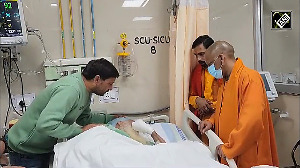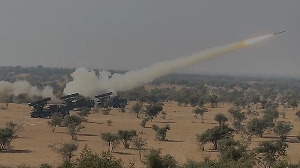Sprawled across 50 acres in the tranquil town of Ranjangaon, 65 km from Pune, is Korean major LG Electronics' second state-of-the-art plant after its factory at greater Noida.
Besides making television sets, engineers are busy assembling 40,000 semi-knocked-down mobile handsets a month. By November, when the plant becomes operational, LG will begin manufacturing two million sets a year.
Last week, K Y Lee, chief executive officer of the fourth largest mobile handset manufacturer in the world -- BenQ -- was down from Taipei to survey the Indian market.
It was Lee's third visit in 18 months. BenQ which currently imports 30,000 handsets every month has set a target of hawking 500,000 handsets a year in India by the end of this year.
By then, it hopes its market share, as per retail audit unit Operations Research Group, will move up from 3.1 per cent in 2004 to nearly 6 per cent.
And with Nokia investing around $100 million {over Rs 434 crore (Rs 4.34 billion)} to $150 million {Rs 651 crore (Rs 6.51 billion)} over the next four years to set up a manufacturing facility in India (its ninth globally), and a host of other players including Motorola and Samsung waiting to dial in, everyone wants to leverage the sheer potential of the Indian handset market.
Says Sanjeev Sharma, managing director of Nokia India: "India's position at the heart of a rapidly growing mobile communications region makes it an attractive option for establishing our new manufacturing facility. The new factory would be an integral part of our global manufacturing network and help fulfill growing demand as mobile communications become increasingly affordable and available to more people in this diverse Asia Pacific region."
He says that production will begin in the first half of 2006. Adds C M Singh, general manager of LG Electronics: "In the next three years, India will be the world's biggest market."
Just how attractive the market will be is evident from the number of mobile handset brands available in the country.
Until recently, barely eight handset brands were sold in India. By this year-end, telecom players claim that more than half a dozen new brands will ring in.
These include Meridian Telecom from Russia and Nungbo Bird from China. Even the Bangalore-based BPL Mobile and Korean manufacturer Hyundai want to capitalise on their prevalent brand equity.
Compare this with China where 30 domestic brands jostle for space along with multinational brands. In Taiwan, about 40 brands are vying to be picked up.
Also, a white paper by Finland's Elcoteq Network Corp, which recently inaugurated its 6 million capacity plant in India, cites the department of telecommunications as saying that Indian cellular industry revenues will touch $15.61 billion {Rs 67,794 crore (Rs 677.94 billion)} over the next three years.
The telecom infrastructure market then will be valued at a whopping $1.88 billion {Rs 8,165 crore (Rs 81.65 billion)} annually. Also, the market for services and equipment will have skyrocketed from $13.71 billion {Rs 59,543 crore (Rs 595.43 billion)} in 2001 to $24.29 billion {Rs 105,491crore (Rs 1054.91 billion)} by next year.
What's more, today the total mobile handset population in the country is pegged at 18 million. A report by consulting firm McKinsey expects the market to touch 100 million by 2007.
But manufacturers claim that they will breast the tape much earlier. That's because while the first time user base will keep growing, the replacement or upgrade market is equally robust.
Two years ago, replacements accounted for barely 10 per cent of the total handset market. Today, it is about 25 per cent and manufacturers reckon that it could touch 30 per cent to 40 per cent in the next two years.
"Contributing heavily to this are the new value added services offered by telecom players," says K S Ravichander, general manager, sales and distribution at Philips Electronics.
He is noncommittal about Philips' plans to set up a manufacturing base here. At the moment, all of Philips' handsets are imported.
In fact, upgrades are being largely triggered off by the changing role of the mobile phone. For what began as a communication tool is now a multimedia device.
Also, being seen with the latest mobile model is considered hip for the image conscious.
That's why, to be in sync with the trends, manufacturers want to inch closer to their target audience. "The main competitive advantage that we expect will be in being close to the market and being able to cater to the demand from this region," says Nokia's Sharma.
What also makes it worthwhile is the response time. Earlier, a new mobile handset took 5 to 6 months to hit the market.
"Setting up a base here means doing it in 2-3 months. Moreover, you can customise your offerings," feels LG's Singh.
And the demand for phones is largely going to come from the lower end, reveals D Prasanna, business manager of BenQ's mobile venture.
Two years ago, 80 per cent of the market was dominated by black and white mobile screen sets. Today, colour phones account for half the total market.
And by the end of the decade, like televisions, the share of black and white sets will crash to a mere 10 per cent, say manufacturers.
With two manufacturing facilities in Taiwan and China, BenQ's investments are more in research and development. "We plan to strengthen our manpower from 40 to 70 for the mobile unit," says Prasanna.
With 21 new models launched this year, he says that the tally will go up to 65 by this year-end. "We don't have a model in black and white and many of our new models will be catering to that segment," he adds.
LG, the leading manufacturer of CDMA phones wants to operate only in the middle and top end of the market.
"Typically, the mobile phone industry has had somebody manufacture the phone, while someone else designed it. Now we want to be a one-stop shop. And the potential in India justifies setting up a manufacturing base," says Singh.
The company is reported to be investing Rs 500 crore (Rs 5 billion) in Ranjangaon.
How are all the manufacturers making certain that they don't get a missed call? Says Philips' Ravichander: "By being aggressive on the innovation and product front, pricing it right and ensuring consumer pull."
With all the manufacturers talking similar strategies, it's a sweet ring tone for the end user.







 © 2025
© 2025